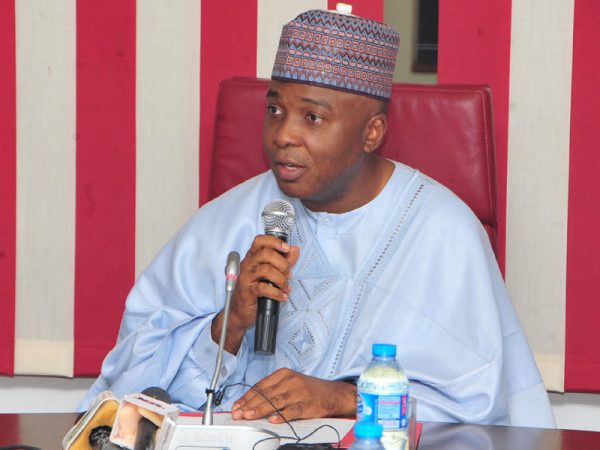The President of the Senate, Dr Bukola Saraki, has called for less interference with activities of anti-graft agencies as a way of fighting corruption.
Saraki disclosed this at the opening of the “National conference on the role of the Legislature in the Fight against Corruption”, in Abuja on Tuesday.
He said that if the fight against corruption must be won, then institutions charged with checkmating corruption must be strengthened to perform better.
He said that institutions must act with integrity to sustain success against corruption and to prove to Nigerians that the anticorruption fight was treated seriously by the government.
“If we must make significant inroad against corruption, we must strive to protect our accountability institutions from the virus of political interference no matter how well meaning they may be
“They must be enabled to operate in an atmosphere of political neutrality, efficiency and fairness as envisaged under the constitution.
”This, in my view means that while these institutions work in collaborative form, there must be minimal intrusion in the operation decisions and working of our apex institutions like the EFCC, the ICPC and the Police Force
”History has shown that it is not enough to simply round people up forcefully and throw them in jail under the guise of a successful anti-corruption fight,” he said.
He, therefore, said that more should be done to prevent corruption to reduce the need to fight it after acts of corruption had been perpetrated.
“Perception is key in this fight. The anti-corruption drive cannot be undertaken as a media glitz.
”This is why governments across all levels must work to strengthen the capacity of our agencies to make informed decisions and be inclined towards good knowledge of the law, rigor and transparency in all their doing
”The more open and transparent the process, the less opportunity there will be for abuse of office,” he said.
He also said that a lot more could be achieved with greater civil engagements, adding that citizens must be carried along to sustain the fight
He said that the fight should also get to the local levels with individuals denouncing corrupt individuals and those who normalise dishonesty, bribery and exploitation.
”This is why I urge sensitisation of our community leadership and the wider local communities to join the fight through the denouncement of corrupt individuals and those who normalise dishonesty, bribery and exploitation
”We should denounce those who live far and above their commensurate earnings.This must be incentivised by government paying workers a living wage.
He said while the fight against corruption cannot be fought and won on the basis of prosecution of offenders alone, a greater effectiveness could be achieved by applying preventive measures across the public spectrum
He called for adequate education, ethical reforms and use of technological support systems for better auditing and public procurement systems that help cover loopholes for corruption.
He advocated use of electronic tenders to reduce the risk of corruption and increase the effectiveness of public procurements.
Saraki also proposed an eight-point plan of action to achieve success in the ongoing anti-corruption crusade of the present administration.
According to him, what must be done to succeed in the fight against corruption include ensuring transparency in government processes and procurements.
He also advocated reduction in bureaucratic bottlenecks, education and technology adaptation, adoption and enforcement of sensible rules and reduction of discretions.
Saraki gave support to the impartial application of sanctions while calling for capacity building and effective monitoring and oversight.
“We must ask ourselves, what did other nations who recorded success in the battle against corruption around the world do to achieve results?
”What do we need to do differently to achieve a better and different result?
“The fight against corruption must remain driven by an articulated and well delivered strategy.
”One that is robust, multifaceted and driven by leadership across all aspects of our political and social systems.
“It cannot be the fight of one man; rather the vigilance of every one of us in our various spheres of influence. Let me share some of my personal experiences with you to shed light on some of the strategies that I have utilised in the past.
“In the 7th Assembly, I remember personally leading the charge to expose the corrupt fuel subsidy arrangement that was in place.
“This led to the indictment of several individuals and companies who were exploiting the weak institutional structures in the design of the scheme to the detriment of millions of Nigerians,” he said.
He said that the motion that revealed the fuel subsidy corruption saved Nigeria N500 billion.
The conference was organised by the National Assembly and the Presidential Advisory Committee Against Corruption (PACAC) in collaboration with the European Union, United Nations Office on Drug and Crime and the African Development Studies Centre in Abuja. (NAN)

